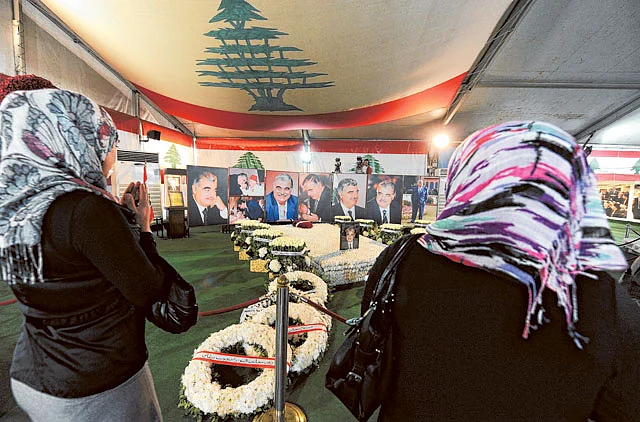Ramifications of Hariri’s assassination, 15 years on
His death was a political earthquake in Lebanon, and country has still not recovered

Beirut: The gigantic blast that targeted the convoy of Lebanon’s late PM Rafik Hariri and killed him continues to have a drastic impact on the ‘unwell’ small Mediterranean country since February 14, 2005.
Fifteen years on, the ramifications of Hariri’s assassination are still crippling the country, disrupting its growth and development.
Lebanon has been gripped by anti-corruption and anti-government protests since October 17, 2019
Protestors have been rallying and calling for reforms and the downfall of the political class that they consider corrupt and inefficient. Political clans, that have been in power since 1992 have been blamed for the worsening financial and economic crisis.
Sami Nader, a senior political analyst and Director of Levant Institute for Strategic Affairs (LISA), told Gulf News that "the assassination brought a devastating impact on Lebanon and was so disruptive that it took the country off track.
“Lebanon was on the track of reconstruction. Mainly, there was a balance of power that was necessary to ensure stability and this balance got disrupted. We saw Lebanon drifting by the day towards the Iranian axis and [eventually] became more aligned with Iran."
The assasination brought people together
One cannot disregard the Cedar Revolution, which was triggered by Hariri's 2005 assassination. It was a very pivotal event in the country’s history, and brought together different sectarian and social groups.
"You cannot talk about Hariri’s assassination without mentioning the Cedar revolution, which was a building block in our history,” Nader told Gulf News.
Unfortunately, the Cedar revolution, according to LISA’s director, didn’t succeed socially and culturally, and it was hijacked by the traditionalist forces.
Iranian axis and Hezbollah
On whether Lebanon is better off or struggling 15 years after the assassination, Nader said the country was struggling because its economy and security had been exposed to what is happening in the region.
“Most importantly, today Lebanon is isolated from the international arena because of the gradual drift towards the Iranian axis, and [due to] Hezbollah getting the upper hand in domestic politics.
"Lebanon has seen its relations deteriorate with its Arab neighbours and with the international community … don’t forget that Hezbollah is seen as a terrorist organisation by the GCC countries, Washington and by key European countries. This is very important, and hinders Lebanon's attempts to solve its economic problems,” he said.
Fellow political science university professor and researcher Professor Michel Douaihy considers that Hariri’s assassination was the first big political assassination since the end of Lebanon’s Civil War in 1990.
“A brutal assassination of the leader of one of the biggest communities in the country, and the way it happened, obviously was an attempt to introduce a new way of doing politics in town.
"It meant no opposition was allowed to the Syrian presence/occupation of Lebanon, which was backed by the Iranian regime, obviously,” Douaihy told Gulf News.
What changed, what remained the same?
On Tuesday, the new Prime Minister Dr Hassan Diab’s cabinet won 63 votes of the quorum of confidence in the Lebanese parliament.
On what has changed and has not since the February 14’s assassination, Douaihy said "the crime was a key point of reference in modern Lebanese history, so there is a post- and pre-assassination [situation].
"Since the assassination, the country has been mismanaged by the same old parties, and one of the parties is accused of masterminding Hariri's killing. Lebanon is really struggling due to the fact that political institutions aren’t working, the economy has collapsed and due to the mismanagement of the political class for the last 30 years was awful."
On whether Hariri was to be blamed for any of what is happening today, Prof. Douaihy said his economic policies were neoliberal in the sense that they relied heavily on policies developed by the IMF and the World Bank.
“Those policies don’t work in 3rd world countries where corruption greatly impacts the economy. Put aside that I think Hariri had issues working with political classes that emerged from the war, namely warlords. Sometimes he seemed okay. I’m really not sure how he would’ve dealt with what happened in the past four months."
He added: "His economic policies were disastrous. This country cannot be built on an economy based on services, banking, insurance or real estate … it needs serious economic reforms and changes, which he wasn’t a fan of,” he said.
“The new generation that took to the streets on October 17 were either not born or were very young when Hariri was in office. So they have no position, for or against, his policies. They really had no emotional connection with this assassination, so this is why it is very important, in the sense, that the October 17 movement/revolution has really ended the political rhetoric of the March 14 and March 8 [political groupings] that was created after the assasination."
"So what happened in the last 4 months ended for good the post-assasination political scene,” he said.
Sign up for the Daily Briefing
Get the latest news and updates straight to your inbox
Network Links
GN StoreDownload our app
© Al Nisr Publishing LLC 2026. All rights reserved.